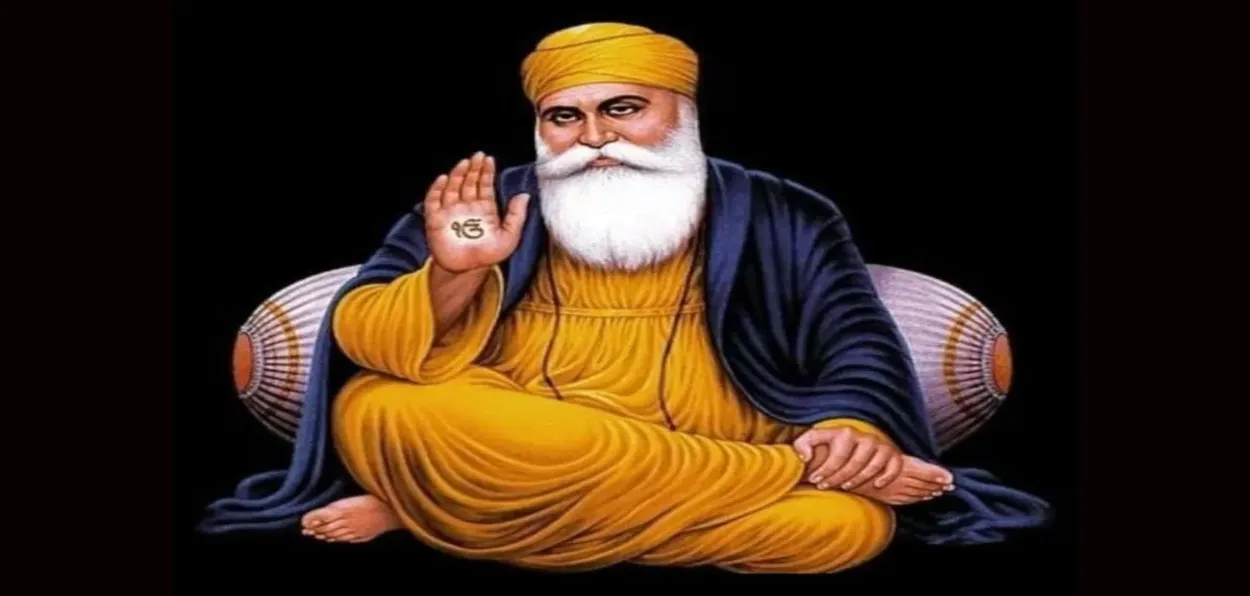
Amir Suhail Wani
In the quiet dawn of 1469, when the mists still lingered over the fertile plains of Punjab, a child was born in the small village of Talwandi. He was destined to awaken the conscience of humanity. That child was Guru Nanak Dev, the founder of Sikhism, whose light would forever alter the spiritual horizon of the world.
He came not as a preacher of dogma or a prophet of one creed against another, but as a messenger of oneness — a bridge across religions, languages, and civilisations. His legacy does not rest in marble domes or ornate shrines but lives in the hearts of those seeking truth through compassion, humility, and service.
At that time, the world was beset with unrest and fragmented. Society was bound in the rigid chains of caste and superstition; temples and mosques saw more rituals than reverence and devotion. Inequality was sanctified, and spirituality had become the privilege of the few. Into this darkness, Guru Nanak brought a message as luminous as dawn: There is but one God, and His light shines equally in all.
To him, religion was not a matter of identity or external marks, but an inner awakening — a recognition of the same divine breath flowing through every living being.
When he was asked to wear the sacred thread of caste distinction, he refused gently, declaring that true purity lies not in cloth but in conduct. His wisdom pierced through the hypocrisy of empty ritualism, urging humanity to replace pride with love and prejudice with compassion. “There is no Hindu, there is no Muslim,” he proclaimed, not to erase faiths but to remind humankind that beneath their names and forms lays a single, radiant essence.
Guided by divine inspiration, Guru Nanak set forth on a series of journeys, known as Udasis that carried him across vast lands— from the snow-clad Himalayas to the deserts of Arabia. He walked not with armies or riches, but with the simple power of his words and the purity of his heart.
In bustling cities and remote villages, among scholars and shepherds, kings and peasants, he spoke in the universal language of love. His hymns, later enshrined in the Guru Granth Sahib, were not sermons reserved for the devout few, but songs of awakening for all mankind. Wherever he went to Mecca, Baghdad, Srilanka, or Tibet, he left behind the echo of unity, reminding all that though God may be called by a thousand names, the divine truth remains one and indivisible.
The teachings of Guru Nanak were both simple and revolutionary. He urged humanity to remember God with mindfulness and devotion (Naam Japna), to earn an honest and righteous livelihood (Kirat Karni), and to share one’s earnings and blessings with others (Vand Chakna).
These were not merely moral injunctions but pillars of a life balanced between the spiritual and the worldly. He envisioned a society where labour was sacred, equality was lived, and compassion was action.
His brought in spiritual democracy, that makes every individual to commune directly with the Divine.
Centuries later, the Sikh community continues to carry his vision. Across continents and cultures, Sikhs are known not only for their faith but for their service. Wherever there is hunger, there is langar — the community kitchen that embodies Guru Nanak’s idea of equality. In the langar hall, there are no hierarchies: kings and labourers, Hindus and Muslims, believers and atheists, all sit side by side and share the same meal. It is not merely nourishment that is served there, but human dignity and fraternity.
In moments of global crisis, too, the Sikhs have risen as torchbearers of his compassion. From earthquake zones to refugee camps, from hospitals to homeless shelters, Sikh volunteers — inspired by the principle of seva, or selfless service — continue to extend a helping hand. Organisations like Khalsa Aid exemplify this boundless benevolence, rushing to aid victims of war, disaster, and displacement without ever asking for faith or reward. For them, as for their Guru, to serve humanity is to serve God Himself.
The abiding legacy of Guru Nanak thus lays not in the past but in the living present — in every act of kindness that bridges division, in every heart that beats with empathy instead of fear. His timeless message reminds us that hatred and separation are man-made veils, and that enlightenment begins when we learn to see the divine spark in all.
In this age of polarisation, fanaticism, and spiritual emptiness, Guru Nanak’s message resounds like a song from eternity, calling us back to simplicity, humility, and unity.
ALSO READ: Painter Jilani paints hope and dignity for common people
As we celebrate Guru Nanak Jayanti on the November 5, let us listen to that the eternal hymn of oneness and strive to live his message to become instruments of peace and service in our own corners of the world.
